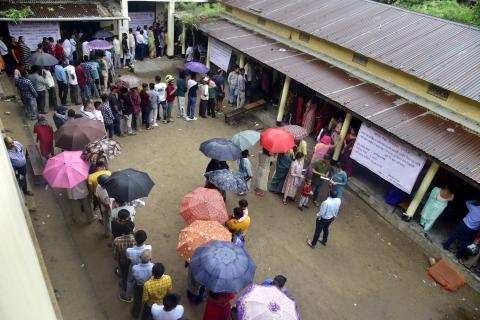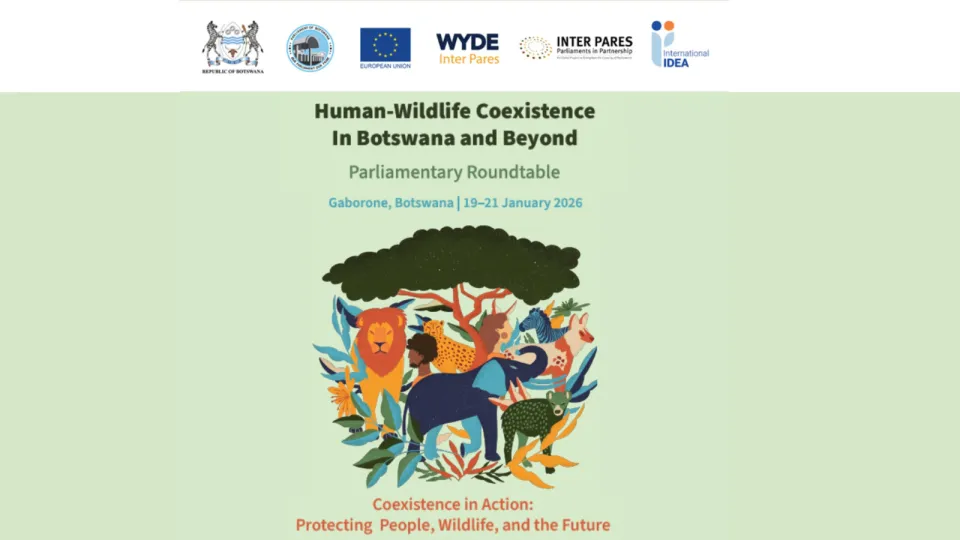
The 2024 election year in review: Climate at the ballots?

About this time last year, headlines like “This is the year of the climate election”, “Democracy and climate politics are set to collide next year” and “It’s the world’s biggest election year – Is democracy good for climate change?” appeared in our feeds. It was pointed out that 2024 was going to be a truly crucial year for global climate action. Not only did we see a record number of national elections, but many of these took place in countries with significant impact on global climate change, such as the US, the EU, India, Mexico, and South Africa.
Observers were however skeptical whether climate change would in fact attract the attention it deserves in the different elections. While opinion polls tell us that citizens across the world overwhelmingly want their governments to do more in this field, climate and the environment remain most of the time marginal topics in national electoral debates.
In 2024, we have witnessed climate change impacting electoral processes in at least 20 elections around the world, as illustrated in International IDEA’s 2024 Election Emergency and Crisis Timeline. But to what extent has climate change featured in electoral campaigns this year? Has climate, as it were, been at the ballots? The review below considers the issue in different regions of the world, based on press coverage and academic studies.
Europe and North America
19 countries in Europe held elections in 2024. In addition, the citizens of the 27 EU member states elected a new European Parliament. Europe is warming faster than any other continent and, when polled, EU citizens show almost unanimous concern about the climate crisis. Yet climate and the environment were conspicuously absent from most election campaigns. Higher on the agenda were issues around the cost of living, welfare, and security, brought forward by Russia’s war against Ukraine.
Austria is a case in point. While climate change figured as a prominent topic in the 2019 parliamentary election, it was barely mentioned in the 2024 campaigns. However, just weeks before citizens were called to vote, the country was hit by severe rainfall and flooding, which brought climate change back on the agenda. Almost all leading candidates reacted to the floods, but the focus was mainly on crisis response and climate adaptation measures. It does, however, not seem as if it had a decisive effect on the election outcome. A survey showed that less than 10% of voters were ‘very’ or ‘somewhat’ influenced by the floods in their decision. FPÖ, running on a platform to weaken climate ambition, emerged as the biggest party, while liberal, centrist, and green parties lost seats.
The Austrian results echoed wider trends seen in the June election for the European Parliament. Liberal, green, and centre groups lost seats, while right-wing populist parties gained, many of whom oppose climate action, including the legislative package of the EU Green Deal adopted in 2020. The outcome of the election caused less of a political shift than expected, and the major pro-European political groups retained a majority in the European Parliament. At the same time, there are concerns that this “greenlash” might bring about a de-prioritization of climate and environment in the EU. What is interesting to note is that public opinion on climate change in Europe has not changed much in the past years. In both the 2019 and 2023 Eurobarometer, 93% of EU citizens considered climate change a serious problem and it ranked 5th among voter priorities in a 2024 pre-election survey.
The United Kingdom general election provided a slightly different outcome, with a decisive victory for Labour and political gains for both the Liberal-Democrats and the Green Party. Polls did not suggest that climate change was a top voter priority across the political spectrum, but it may nonetheless have contributed to the election outcome, as 83% of Labour voters said their climate change opinion influenced their choice. More specifically, in the months preceding the election, the Conservative government had made several moves appearing to roll back on climate action, while Labour had committed, for instance, not to pursue new exploration for oil and gas and to double down on investment in renewable energy.
The United States' presidential election in November was likely the most consequential one for climate action. The second largest CO2 emitter in the world is also the country where the topic of climate change seems most divisive. One pre-election survey showed that 62% of the electorate preferred a candidate who supports climate action. At the same time, climate change ranked only 19th among 28 issues polled for importance—though this number hides significant differences across voting groups, as it ranged from 4th most important topic among liberal Democratic voters, to 27th for conservative Republican voters. Yet climate change did not play a central role in the debates, even though the presidential candidates presented markedly different climate agendas, with estimates showing that Donald Trump’s incoming presidency might end up adding 4bn more tons of CO2 emissions by 2030 compared with continued Democratic rule.
Asia and the Pacific

It has been argued that, as the most populous region in the world and accounting for half of global emissions, the battle to reach net zero CO2 emissions “will be won or lost in Asia”. The climate crisis is already impacting people across all of Asia and the Pacific, but the topic of climate change as such did not feature prominently in the 16 elections held across the region in 2024, with some exceptions. Specific issues relating to climate impacts, however, appeared in the debates, for instance around management of water and natural resources, agricultural resilience, or government responses to the increasingly frequent climatic hazards.
Taking place between April and June, the general elections in India were impacted by a catastrophic heatwave, claiming dozens of poll worker lives and possibly contributing to lower voter turnout. India is a highly climate vulnerable country which is seeing progress on its climate policies, although remaining heavily reliant on coal. Different polls have shown that over 80% of Indians are ‘worried’ about climate change—50% ‘very worried’—and that climate change is among the top concerns for young Indians. The 2024 elections saw all major parties make pledges on climate action, which was not the case only a decade ago. Yet climate change as such was not a major campaign issue, the attention focusing rather on specific impacts and sectors, for instance water management, disaster preparedness, and agriculture.
Similarly, Indonesia is highly vulnerable to the impacts of climate change, while also having the potential to significantly contribute to tackling it, in particular when it comes to management of its vast rainforests and mineral reserves. A 2023 study showed that 73% of Indonesians are worried about climate change, and a 2024 poll showed that 86% want their government to increase climate action. Climate change as such is, however, not a priority issue among Indonesian politicians, and while the three presidential candidates in their 2024 campaigns made specific pledges in this field, it was not a widely debated topic. Indonesia remains heavily reliant on fossil fuels, and analyses predict mostly policy continuity from the new government led by Prabowo Subianto, although the president has made some early statements in favor of increasing the country’s climate ambition.
Five small island states in the Asia and the Pacific region—Tuvalu, Solomon Islands, the Maldives, Kiribati, and Palau—held elections this year. Two of these elections, in Tuvalu and in the Solomon Islands, were affected by extreme weather events, exacerbated by the impact of climate change. These countries share many climate-related challenges, ranging from sea level rise and coastal erosion to exposure and vulnerability to disasters, and are strong advocates for climate action, in particular fossil fuel phase-out. While diverse in their political landscapes, electoral debates this year mostly revolved around geopolitics and cost of living, but climate change remained a priority, central to the political discourse.
Latin America and the Caribbean
Starting with El Salvador in February, voters in seven Latin American countries went to the polls this year. Climate change and environmental degradation are major concerns in Latin America and the Caribbean. For instance, 91% of respondents to a 2023 climate survey believe that climate change is affecting their daily lives. At the same time, these challenges coexist with issues such as violence and crime, poverty and inequality, and unemployment.
The Mexican general elections were described as the most interesting and important contest in the region when it comes to climate change. All main presidential candidates addressed climate and environmental issues, mainly focusing on mitigation and energy transition, and climate change featured, for the first time, in the televised presidential debate. The background of the election winner also generated headlines: Claudia Sheinbaum is a climate scientist, known for the green initiatives she led as mayor of Mexico City. In her presidential campaign, she promised to promote decarbonization and increase investments in renewable energy. It remains to be seen whether action will follow, depending how far the new president will be ready to change course for the country, where the oil industry for long has been central both politically and economically.
In Panama’s general elections, alongside migration, corruption, and the economy, two key environmental topics featured in the campaigns: Firstly, water supply, both in terms of access to drinking water and operation of the Panama Canal. Secondly, the closure of Central America’s largest copper mine, Cobre Panamá, as a consequence of major protests and a decision of the Panama Supreme Court in 2023. All leading candidates supported the closure, irrespective of the questions raised over its potential impact on the national economy.
In contrast, July’s presidential election in Venezuela showed little salience for environmental or climate issues. Due to the highly contested nature of the political process in the country, the focus of the opposition was on the restoration of free and fair elections and the recovery of the economy.
Africa and West Asia
22 elections were scheduled in Africa and West Asia in 2024. In most of them, climate and the environment were not on the ballot, as socio-economic issues, such as youth unemployment, the cost of living and security, appeared more concerning for most electorates. Africa is experiencing an increasingly heavy impact from climate change, while contributing the least to global carbon emissions. According to the latest Afrobarometer on the topic, climate awareness is relatively low across Africa, but among citizens who are aware, a majority want their government to take stronger action.
In the South African presidential elections, party manifestos did address climate change, but neither mitigation nor adaptation were issues central to the election campaigns. There was, however, some debate around energy policy, though less in the context of how the country will decrease its high per capita emissions and meet its Paris Agreement commitments, instead focusing on jobs and the economy.
In Mauritania, a country highly affected by both droughts and floods, climate and environmental issues were not on the electoral agenda in June’s presidential election. Despite some campaign references to renewable energy and Mauritania's future role as a producer of green hydrogen, (youth) unemployment, poverty, and access to basic services, as well as inequalities and the fight against corruption, were key issues.
Similarly, in Algeria, where severe water shortages led to protests in June 2024, none of the three main candidates for the presidential election in early September focused on climate or environmental issues. There was also little or no mention of these issues in manifestos. Interestingly, a common theme was the promise to reduce the country's dependence on rents from the export of fossil fuels.
In contrast, in Mozambique's presidential election in October, climate topics did feature in the debates. In addition to focusing on the armed conflict in Cabo Delgado, job creation, and the economy, almost all candidates campaigned on climate resilience and development issues. Mozambique is vulnerable to climatic shocks that exacerbate the existing food crisis and the country has been hit by several deadly cyclones in recent years.
Political salience of climate action in times of elections
In summary, citizens and voters all over the world are concerned about their livelihoods, security, and the future of their children. They are also increasingly concerned about climate change and broadly in favour of climate and environmental action. However, political contestants in most cases fail to link the two and to advocate for policies that can address these concerns together and in a meaningful way.
This lack of political salience has to do in part with the tendency of electoral campaigns—and democratic institutions in general—to focus on short-term problem solving and quick wins. Although climate change is already happening, it is still perceived as a mainly long-term issue, and those rarely win elections. In some cases, lack of political interest also stems from low levels of climate change awareness, or a tendency to shy away from the issue which is perceived as divisive. The cases where climate and environmental topics rose to electoral prominence in 2024 were largely where the consequences of climate change are already being felt today, and adaptation efforts are facing the test of implementation.
Raising the political salience of climate action requires firstly investment in education and research, as well as support to civil society, academic institutions and climate journalism, which are key in bringing the topic to the forefront. Secondly, the structural drivers of short-sighted thinking and decision-making need to be overcome. This includes promoting institutional reforms that place sustainability and the long-term interest of future generations at the centre of our political systems. It also requires coming to terms with policy capture from fossil fuel interests, which in many parts of the world still considerably influence political agendas.
To what extent the 2024 elections will affect the global efforts to combat climate change remains now to be seen, not least since it depends not only on national governments but also local, regional, and international action. Nevertheless, as the year comes to a close, we have once again been reminded of just how intimately climate change and democracy are intertwined.





